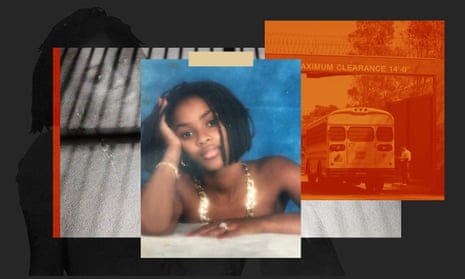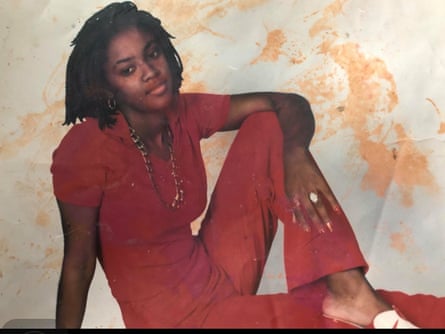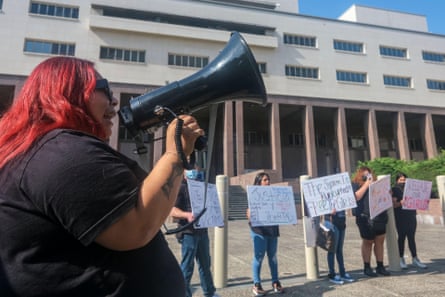Survivors recount rampant abuse at Los Angeles’ juvenile jails: ‘Helpless, hopeless, lost and lonely’

"Maisha was 16 years old when the officer inside Los Angeles juvenile hall began to take interest in her. At first, she said, he was friendly, and she would run errands for him, including delivering paperwork to his office; then, when no one else was around, he started grabbing her.
She tried to avoid being alone with him, but the groping and sexual assault escalated, she said, adding that he once assaulted her when she went to pick up her inhaler.
Maisha, who was incarcerated in 1997, knew the assaults were happening to other girls, but she never considered reporting it, she recently told the Guardian: “If you tell on staff, then the other staff are going to treat you wrong and say you’re lying. I wouldn’t have told on nobody. It was ‘snitches get stitches.’ When you grow up like that, that’s all you know until you learn something different.”
Now 42, Maisha is speaking up for the first time about the abuse she says she endured while imprisoned in America’s largest juvenile system – and she is far from alone. Nearly 300 people have come forward in a lawsuit against LA county, detailing claims of sexual abuse by officers in juvenile jails, spanning from 1972 through 2018. The case paints a disturbing picture of systemic misconduct and violence against multiple generations of children in the most vulnerable circumstances, some as young as 10 and 11 years old.
Staff sexually violated children in their cells, bathrooms, hallways, medical areas, solitary confinement and throughout more than a dozen boys and girls’ detention halls, the suit says. Some victims were handcuffed when they were assaulted, and officers frequently intimidated victims into silence and submission, saying they’d be punished in isolation, get longer jail time or be permanently separated from their families if they spoke up, according to a 359-page complaint filed in December.
While some of the overwhelming volume of testimony is from decades past, scandals over the last two years suggest that the mistreatment and neglect of children behind bars in LA is not a historical problem. On the contrary, the crisis has recently worsened, even after years of scrutiny and oversight.
‘I didn’t live a childhood’
Maisha grew up in Compton in south Los Angeles in the 1980s and faced homelessness and violence at a young age. Her mother struggled with drug addiction, and the family frequently squatted, she said. “I became very angry,” said Maisha, recalling how her mother left her and her siblings to fend for themselves when she was about 13 years old, leaving her to rely on an 18-year-old man from the neighborhood for rent, before he ended up incarcerated. “I didn’t live my own childhood life,” she said. (The Guardian agreed to identify her by her first name to protect her privacy).

Maisha eventually got involved in gangs, with violent incidents landing her in Los Padrinos juvenile hall, a facility that had long been plagued by claims of abuse and dangerous conditions.
She was jailed amid a “tough on crime” crackdown in the 1990s and rise of the racist “superpredator” myth, which led the US to dramatically increase its imprisonment of Black youth. By 2001, more than 4,000 youth were housed in LA juvenile halls and camps, which were significantly over capacity. The county addressed overcrowding by continuing to expand its system. The youth inside shared similar vulnerabilities; the director of one probation camp for girls said at the time that 70% of the girls had experienced sexual abuse in their lives.
One woman, Ms Jones, who asked to only use her last name, said she wasn’t even a teenager when she was sent to LA juvenile hall in the early 90s after getting in a fight.
“It was scary. It was a whole environment I wasn’t used to, with these strangers and adults cursing you out and mistreating you. I felt like I was at a dog shelter,” she said, recalling her arrival to the facility. “It felt like torture. My grandma did her best to take care of me and protect me, but when I was taken from her, I just felt helpless, hopeless, lost and lonely.”
The federal government also repeatedly investigated LA’s juvenile system fromthe 80s through the 2000s due to reports of frequent use of pepper spray, hogtying children, overmedicating youth and neglecting the needs of suicidal kids.
And sexual violence, new litigation suggests, was rampant.
‘Nobody believes you’
Three recent lawsuits have outlined decades of sexual abuse in LA juvenile facilities, including two cases on behalf of 70 women and the most current suit on behalf of 279 people, including Maisha and Ms Jones. The cases were filed under a California law that temporarily lifted the statute of limitations for childhood sexual abuse, leading to a flood of litigation against an array of institutions.
Maisha said she had heard stories of staff sexually abusing girls, but didn’t think of it as “abuse” at the time since the misconduct was so normalized inside the facility and in her life. She had already been sexually violated by an adult a year prior to her incarceration, she said: “We viewed it as ‘girls messing with older guys.’ It’s awful. I was used to it.” The complaint details repeated assaults by the officer who forced himself on her. “I never wanted to go to his office, but if I had to, I had to,” she said.
“Maisha was already starting the race several feet behind others due to her upbringing, and instead of helping her, we placed her into the lion’s den of sexual predators,” said Douglas Rochen, the lead attorney on the case. “They were able to target and groom these children for their own sexual gratification, knowing they wouldn’t say anything about it, or that if they did, they would be punished. She had no way to win.”
The suit alleges that some victims were targeted by multiple officers, and that some officers were serial predators.
One of the plaintiffs, known as John “SV” Roe in the complaint, told the Guardian he feared the staff would retaliate against his family if he reported the abuse: “I was afraid they’d hurt my mom, my grandma, my aunt, my sisters. They said I wouldn’t be able to see them, that I wasn’t going to go home. I had to accept it, that I was theirs and I couldn’t say anything.”
Ms Jones said she was molested when she was jailed at 12 years old and then repeatedly raped when she returned to the system at about 15. At least one staff member was aware of the abuse during her second stint.
A nurse gave her birth control shots so she wouldn’t get pregnant, she said.
“This woman knew what was going on, and she didn’t stand up and help us. That really messed me up,” she recalled. “I felt disgusting and violated. Y’all take us away, and you’re supposed to be correcting us and watching us, but instead you’ve got staff molesting and hurting us … And we can’t talk about it because no one believes you. So you hold it inside and let it eat you up.”
She said she had also been abused prior to incarceration and was desperate for support and care: “When I was acting out, I was crying out for help. I needed somebody to talk to me, to tell me they love me and that they are here for me, to let me know there is a light at the end of the tunnel. But I was treated like trash – thrown away into a dungeon with monsters.”

‘This can’t be reformed’
LA’s juvenile hall network has shrunk considerably since Maisha and Ms Jones were jailed, with roughly 500 youth now locked up on any given day across two facilities, nearly all of them Black or Latino. But the stories of mistreatment have remained remarkably consistent.
A recent probation oversight commission report found staff continued to regularlypepper spray youth – including 74 deployments at a single facility in September. That’s despite the county’s board of supervisors voting in 2019 to ban the practice, after decades of concern. The commission also found that youth reported being bored with no programming and that some lamented their inability to regularly talk to their loved ones.
A different county watchdog also found last year that senior probation officials hastily moved youth out of one facility to avoid a state inspection they knew they’d fail. Amid the chaotic transfer, there was increased use of force by staff.
The state agency responsible for monitoring jail conditions also found in 2021 that LA’s juvenile facilities were “unsuitable” for confining youth, the first time in the agency’s 10-year history that it made such a ruling. One facility was still deemedunsuitable a year later, with monitors finding staff were violating health and safety regulations, including failing to regularly check on youth, and falsifying records about it.
All of these problems persist despite a settlement between the state justice department and LA probation that was supposed to improve conditions.
“It’s almost like staff are emboldened, and it’s hard to feel like young people are any safer than they were three decades ago. This is a system that is fundamentally flawed, that cannot be reformed,” said Milinda Kakani, director of youth justice at Children’s Defense Fund California, noting that after decades of travesties coming to light, the county continues to budget more than $400m for juvenile institutions each year – amounting to nearly $1m to incarcerate a single youth. “That is a value statement that we’re making about the lives of these young people, and the extent to which we think they are worthy of dignity.”
Karen L Fletcher, deputy chief probation officer, said the agency does not comment on pending litigation, but wrote in an email, “The probation department has a zero-tolerance policy when it comes to sexual abuse, sexual harassment and retaliation taken against the youths in our care.”
The department requires officers to take a “training on avoiding sexual misconduct”, informs youth on how to report abuse, and has installed surveillance cameras in common areas to “detect and document any inappropriate officer or staff behavior”, Fletcher said, adding: “Any officer or staff person who is found to have engaged in inappropriate behavior with those entrusted in our care will be discharged and, if warranted, prosecuted.”
Probation is “committed to changing the trajectory of an agency that has entrenched, well-known and amply documented issues” and is working closely with state regulators to “cure deficiencies in our juvenile halls”, she continued, claiming that ongoing problems stemmed from “inadequate staffing”. The agency has declared a state of emergency and expanded bonus pay to help increase staffing, and is undergoing an “ambitious renovation program to fix doors, put in new concrete, add WiFi, and change living quarters into a home-like environment”, she said.
A group convened by the LA board of supervisors to “reimagine” youth justice recommended in 2020 that the county reallocate probation funds toward a youth development department that would be focused on care and rehabilitation, not incarceration.
But until that transition occurs, probation will remain in charge of juvenile detention, Fletcher said.
‘I came out a broken person’
Formerly incarcerated youth who have come forward with stories of abuse described a long road to recovery – and lingering consequences far into adulthood.
SV, now in his 40s, said he attempted suicide after getting out of jail and has struggled to maintain relationships: “I went in as a young man with hopes and I came out a broken person who was very traumatized. This is a forever scar that you take to your death bed.”
The complaint calls for damages, including to cover medical and mental health costs. But SV said, “No amount of money is going to put my life back together from when I was 17 and 18 years old until now. But what they can do is stop this from happening to others.” He said other victims like him likely never recovered and might have ended up back in prison or worse.
Maisha, who now works as a vehicle hauler and lives outside of California, said she continues to have a deep distrust of men, but that she wanted to speak out and encourage more survivors to come forward: “We hide so much. I hope that we learn to talk to each other and share our stories.”
And while she hopes the case helps change the system, it was hard to be optimistic, she said: “It’s so broken, and I don’t think it can be fixed. Why send people to jail if they just get worse in there? That’s not rehabilitation.”
In the US, call or text the Childhelp abuse hotline on 800-422-4453. In the UK, the NSPCC offers support to children on 0800 1111, and adults concerned about a child on 0808 800 5000. The National Association for People Abused in Childhood (Napac) offers support for adult survivors on 0808 801 0331. In Australia, children, young adults, parents and teachers can contact the Kids Helpline on 1800 55 1800, or Bravehearts on 1800 272 831, and adult survivors can contact Blue Knot Foundation on 1300 657 380. Other sources of help can be found at Child Helplines International
No comments:
Post a Comment